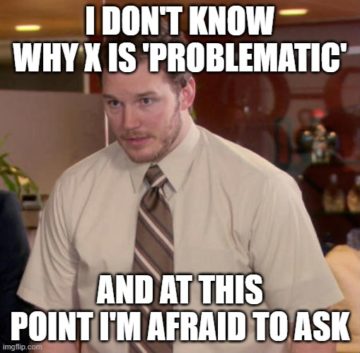by Thomas R. Wells

The term ‘problematic’ seems to be everywhere these days – even in academic philosophy settings where people are supposed to take some care about what they are saying. Both intellectually and morally it is a bad word to use and we should stop.
In ordinary conversation, social media, and even mass-media and academic publications it has now become routine to come across the claim that such and such a person, idea, word or other thing is ‘problematic’.
For example in popular culture: “Sorry, Ross Geller From ‘Friends’ Is Very Problematic”
Or, more specifically to academic moral philosophy: “Kant is problematic these days”
The general point being communicated is negative – the audience is definitely supposed to understand that there is something significantly morally wrong with those ideas or people. But what is it that is so wrong? Despite the consequences such allegations can have – and are often fully intended to have – the accuser seems to feel little responsibility to explain or justify their claim.
In particular, while the problematiser will generally give some indication of the source of the wrongfulness (e.g. Ross tried to kiss his cousin in season 7; Kant made several seemingly very racist remarks in his writings on anthropology), these are rarely set out as a proper argument that includes all 3 required elements:
- the evidence they are relying on and its sufficiency (not merely relevance) to support
- a specific conclusion (not a vague sense of wrongness, or just ickiness), and
- why that conclusion itself matters (so what?)

Not only do we lack reasons to take the claim seriously; we don’t even know what the claim is! Like the “many people are saying” model of misinformation, the problematiser positions themself as merely passing on potentially helpful information for others to make their own use of, without taking any responsibility for its reliability. Sometimes they back away even further and say only that “Such and such might be problematic“.
The result is that the allegation of immorality remains in effect, but has become completely unchallengeable. It has no clear meaning that could be refuted, nor a justification that could be engaged with, nor any individual willing to come forward to explain or defend it.
Thus, a main function of the term ‘problematic’ seems to be of separating the requirements of rhetorical success from those of intellectual rigour, of manipulating (not persuading!) listeners and readers into believing that a vague taint of moral corruption hangs over certain ideas and people, and so we should not hang out with them or with those who do.
In an academic context such anti-intellectual use of rhetoric is an obvious breach of the normative standards of intellectual conversation. But even outside academia its wrongness is also pretty clear. People who make allegations have a moral responsibility for what they are saying. They should allow themselves to be held accountable for their words (in the sense of answering follow up questions and challenges about what they said, not of getting fired from their job if a Twitter mob doesn’t like what they said). And they should pursue honest persuasion that respects their audience rather than seeks to manipulate them.
 It is however too easy to blame the abuse of ‘problematic’ only on those who resort to it as a rhetorical device. Its great popularity derives from making intellectual life easier for everyone by reducing the need to think very hard, or perhaps do a bit of reading, before having an opinion. And these days we are all supposed to have opinions about everything.
It is however too easy to blame the abuse of ‘problematic’ only on those who resort to it as a rhetorical device. Its great popularity derives from making intellectual life easier for everyone by reducing the need to think very hard, or perhaps do a bit of reading, before having an opinion. And these days we are all supposed to have opinions about everything.
Effectively one asks oneself whether one can think of any reason (however inadequate) for not taking some idea seriously. If the answer is yes, then one is free from having to engage with it. I think of the students who scour texts for a word or phrase that jars their modern post-liberal sensibilities (like JS Mill’s brief pro-colonial remarks in On Liberty), so they can be liberated to have an opinion about it without having to think too hard.
If you think there is some important flaw in something then say exactly what you think it is, why it is a flaw, and why its being a flaw matters. If you aren’t able to do all of that then reconsider whether you actually have anything worth saying. Perhaps you have not after all discovered a devastating challenge to the credibility of some author or idea you don’t like. Perhaps intellectual life and public debate could consist of more than the search for excuses not to take other people and ideas seriously.
Thomas Wells is a philosopher at Leiden University in the Netherlands. He blogs on philosophy, politics, and economics at The Philosopher’s Beard.
